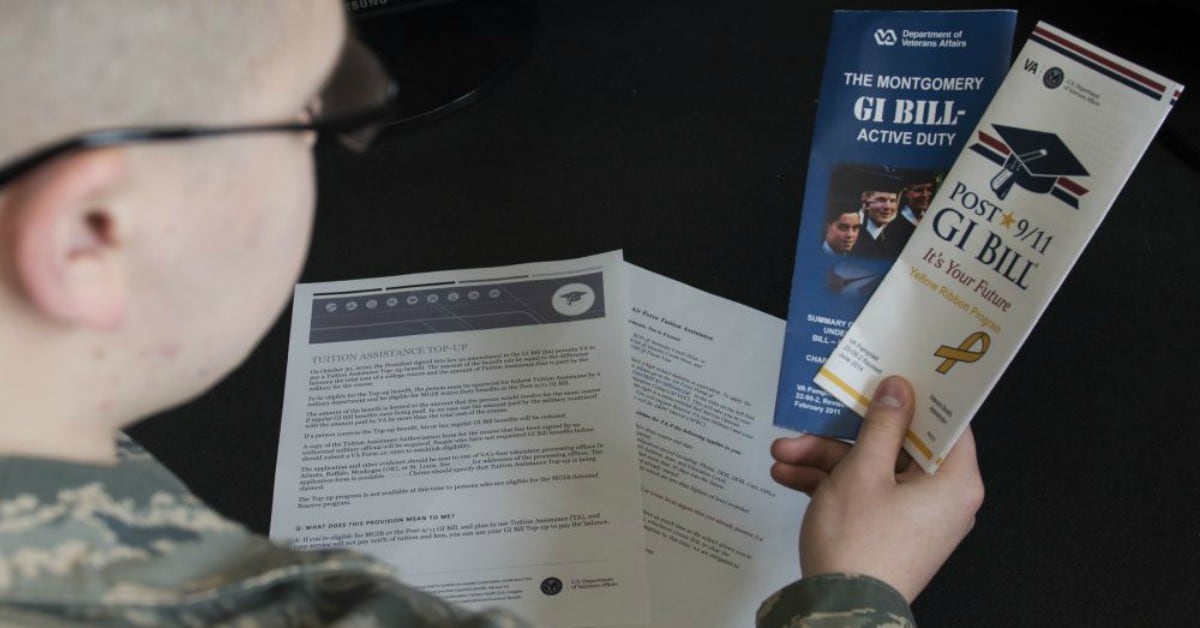Department of Veterans Affairs officials have cleared the way for five schools’ eligibility to enroll GI Bill students, after concluding the schools have adequately addressed “erroneous, deceptive or misleading” enrollment practices, officials said.
But a veterans’ advocacy group says the VA’s decision amounts to an attempt to “ignore federal law in order to protect predatory colleges.”
“The only winners today are the schools that used their money and political influence to evade the law and harm veterans,” said Carrie Wofford, President of Veterans Education Success, in a statement. “The GI Bill statute specifically requires VA to protect student veterans, but the Trump Administration has chosen to defy that law.”
The schools are University of Phoenix, Colorado Technical University, American InterContinental University, Bellevue University and Temple University.
In March, VA officials sent the schools letters threatening to suspend their eligibility, based on findings by the Federal Trade Commission and state attorneys general about the schools’ practices. Officials cited a law that prohibits the use of deceptive or misleading advertising, sales or enrollment practices. Officials gave schools 60 days to take corrective action, and subsequently provided two 30-day extensions.
VA regional offices notified the five colleges of the decisions on July 2, stating the matters had been resolved to their satisfaction.
VA spokeswoman Christina Noel said that after careful review, VA had determined that the schools “had taken adequate corrective actions to avoid suspension of new GI Bill student enrollments.”
Among the actions she cited:
*Cooperation with VA compliance reviews
*Restitution to affected students
*Changes in marketing practice and personnel
*Changes in university leadership
*Renewed annual training for school employees
*Improved oversight of communications with students.
“VA will continue to act in the best interest of our nation’s service members, veterans and taxpayers, and we look forward to working with these schools to ensure they fulfill the requirements for GI Bill enrollments,” Noel said.
However, the fact that the schools took action to resolve prior legal issues isn’t enough to justify allowing them to continue to accept GI Bill students, contends the Veterans Education Success nonprofit advocacy group. The group contends that by law, if VA becomes aware of deceptive recruiting practices of an institution, then the VA must not approve the enrollment of a GI Bill student at that institution.
Jeremy Butler, chief executive officer of the veterans advocacy group Iraq and Afghanistan Veterans of America, agrees. “It was disappointing to see the VA so quickly reinstate these five schools,” Butler said. “I don’t think they were fully transparent in what they were requiring of the schools.”
The VA should ensure that the changes not only ensure the schools are not continuing with the same behavior in the future, but that they “really learn the real lesson about properly taking care of our military and veteran students,” Butler said.
“This sends a signal to all schools that they can use deceptive practices to take advantage of GI Bill users to get their money in the door and to use that to further programs that may or may not be providing a real educational opportunity.”
Two separate 2019 FTC settlements involved three of the schools.
The University of Phoenix and its parents company, Apollo Education Group, reached a settlement with the FTC for $191 million to resolve charges they had used deceptive advertisements that falsely touted their relationships and job opportunities with companies such as AT&T, Yahoo!, Microsoft, Twitter, and the American Red Cross. According to the VA, the University of Phoenix has been the largest recipient of Post 911 GI Bill benefits since the program began.
Career Education Corporation, the previous parent company of both American InterContinental University and Colorado Technical University, reached a $30 million settlement with the FTC and an additional settlement of nearly $500 million with 49 states on charges the CEC used deceptive lead generators to market its schools. The lead generators told potential students the schools were affiliated with or recommended by the military.
RELATED

Here are the corrective actions the schools have taken, according to the VA letters:
University of Phoenix:
*The marketing campaign in question ended in 2014.
*The executive leadership team in place at the time of the FTC review period and the marketing personnel responsible for the advertising campaign have been replaced.
* Marketing activities are no longer outsourced, and the university uses a new review process that requires marketing be approved by multiple departments including the Ethics and Compliance Department, the Legal Department and at times, faculty experts.
*Annual training requirements now include compliance training focused on consumer protection requirements.
*Contacts with prospective students are recorded, analyzed and monitored for key words or phrases that would be potentially problematic; corrective actions with those prospective students are taken in those cases.
*In the wake of the FTC allegations and subsequent settlement, UoP conducted outreach to notify students and make them aware of the waiver of tuition debts for students during the period in question—$141 million and a specific $50 million settlement to be dispersed by FTC for any additional student relief claims (to include any veterans).
*Since 2013, the VA has conducted more than 130 compliance reviews of UoP locations, to include specific marketing reviews in 2017 and 2019. UoP has fully complied with these audits. No findings of deceptive or misleading advertising or marketing were cited.
Perdoceo Education Corporation (owner of Colorado Tech and American InterContinental University):
*They’ve stopped the conduct regarding deceptive lead generators, and have taken the actions agreed to in settlements.
*The FTC, a federal court in Illinois, 49 state attorneys general and multiple state courts are conducting oversight and enforcement of the agreements.
*The company has committed a combined total of about $524 million to pay restitution to affected students, including veterans.
*The company has bought new technology to evaluate lead generator content before buying and using the content.
Temple University
A lawsuit filed in federal court in Pennsylvania alleged that Temple’s Fox School of Business made false, deceptive and misleading statements to U.S. News and World Report regarding the ranking of its Online Masters of Business Administration program, from 2014 through 2017. University officials later discovered similar problems with several other masters programs in the school of business.
*VA found that Temple has provided substantial evidence to VA of its efforts to not only stop and correct the misreporting of data to ranking agencies, but to put in place university-wide protocols to prevent it in the future. The actions have been approved by the Pennsylvania attorney general, the U.S. District Court, and those in the lawsuit affected.
*Those in the lawsuit were paid a combined $5.5 million as part of the settlement, and there was another $2.8 million in non-monetary commitments.
Temple officials also:
* Determined who was responsible for the misreporting of data; and removed the personnel involved.
*Notified U.S. News and World Report, and other agencies and news outlets about the instances of misreported data.
*Instituted policy to address key aspects of the data reporting process, including supervision and oversight.
*Hired the first chief compliance officer, as part of explicit policy requiring mandatory reporting of suspected inaccurate data reporting.
*Provide training for employees about best practices in data collection, verification and reporting.
*Developed new process for rankings data.
*Periodically review compliance, with internal audits.
Bellevue University
A complaint filed by the Nebraska State Attorney General in federal court against Bellevue alleged that from May 2012 to March 2016, the school made false, deceptive, and misleading statements to prospective and then-current students regarding the accreditation status of its registered nurse (RN) to bachelor of science in nursing (BSN) program and the value of a BSN degree from an unaccredited nursing program. The complaint alleged that the RN to BSN program was not accredited before October 2017.
*Between February 2016 and April 2017, nine nursing students complained to the Nebraska Attorney General’s Office about Bellevue’s specialized accreditation. Bellevue responded to each complaint, and four of the nine were closed based on Bellevue’s response
*When Bellevue determined that it would not get the specialized accreditation in the anticipated time frame, it notified students and assisted any who wanted to transfer.
*The University offered scholarships to students who stopped attending prior to full accreditation; three students have accepted, and others have inquired.
*Bellevue has updated all marketing materials related to the RN to BSN program and began having students expressly acknowledge the programmatic accreditation status of Bellevue.
Karen has covered military families, quality of life and consumer issues for Military Times for more than 30 years, and is co-author of a chapter on media coverage of military families in the book "A Battle Plan for Supporting Military Families." She previously worked for newspapers in Guam, Norfolk, Jacksonville, Fla., and Athens, Ga.



